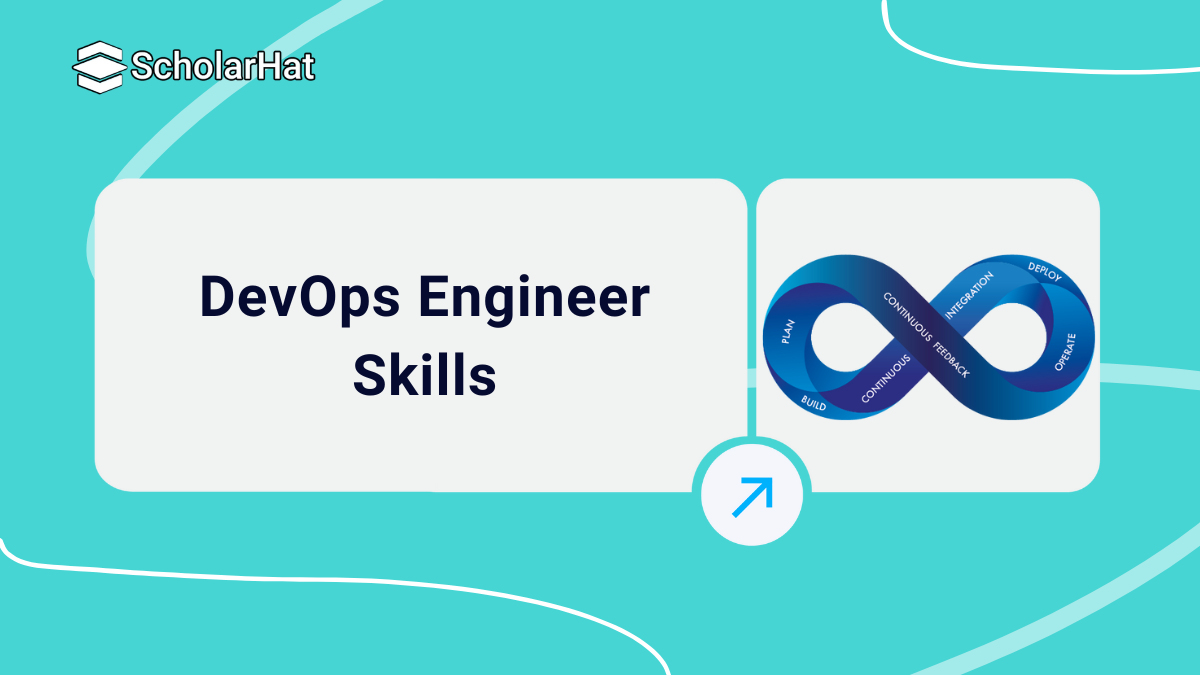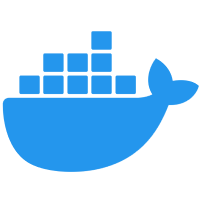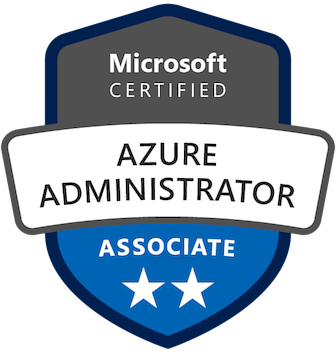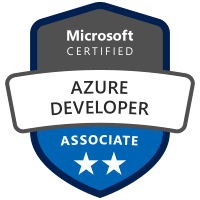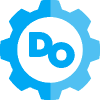15
Feb25 DevOps Engineer Skills for Building a Successful Career
A DevOps Engineer requires a balanced mix of technical expertise and collaboration skills to bridge the gap between development and operations. Key technical skills like cloud computing, scripting and automation, CI/CD pipelines, containerization, configuration management, and monitoring and logging.
The DevOps role is in high demand as India’s companies undergo a digital revolution with automation and AI. A DevOps engineer leads and coordinates different teams’ efforts to create and maintain a company's software. The person who is a DevOps Engineer is an IT generalist, knowing both development and operations, including coding, infrastructure management, system administration, and DevOps toolchains.
Thriving in this dynamic career requires mastering diverse skill sets. To help you out, in this DevOps Tutorial, we'll try to get into the minds of DevOps professionals. We'll try to understand what makes a DevOps engineer technically proficient with a strategic mindset and collaborative spirit.
Read More: Top 50 DevOps Interview Questions and Answers
What Is DevOps?
DevOps is a combination of two different terms, which are 'Dev' and 'Ops', which stand for 'Development' and 'Operations' respectively. So, DevOps is an approach that aims for a smooth collaboration between the teams of Software Development and IT Operations. It is a set of practices, principles, and cultural philosophies that help in improving collaboration.
Who is a DevOps Engineer?
A DevOps Engineer is the one who uses that set of practices, principles, and cultural philosophies in real time to improve collaboration among development, operations, and other teams. The roles and responsibilities of a DevOps Engineer are to combine both software development skills as well as IT operations skills to efficiently communicate and carry out the Software Development Life Cycle smoothly.
Roles and Responsibilities of a DevOps Engineer
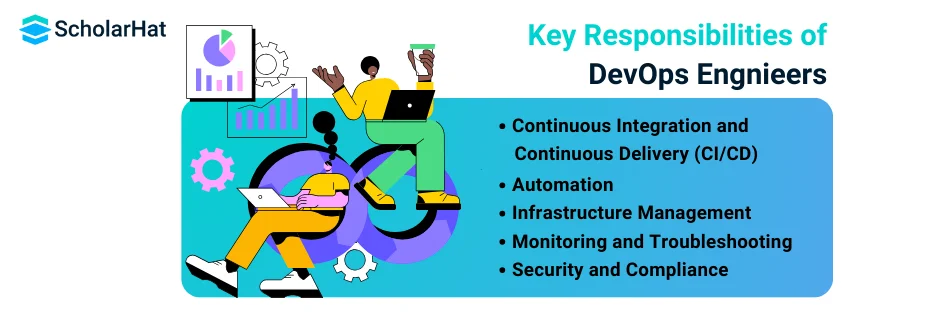
- CI/CD Pipeline Management: Design and maintain Continuous Integration/Continuous Deployment pipelines to streamline code delivery.
- Process Automation: Automate repetitive development, testing, and deployment tasks using tools like Jenkins, Ansible, and GitHub Actions.
- Infrastructure as Code (IaC): Use tools like Terraform or CloudFormation to manage infrastructure through code for scalability and consistency.
- Monitoring and Logging: Set up monitoring (Prometheus, Grafana) and logging systems (ELK stack, Splunk) to track system performance and failures.
- Cloud Platform Management: Deploy, monitor, and optimize applications on cloud services like AWS, Azure, or Google Cloud Platform.
- Collaboration Between Teams: Bridge development, QA, and IT operations to improve communication and reduce silos in the software lifecycle.
- Security and Compliance (DevSecOps): Integrate security checks and compliance tools into the DevOps pipeline to ensure secure deployments.
- Incident Management and Troubleshooting: Quickly identify, diagnose, and resolve production issues to maintain high system availability.
- System Performance Optimization: Analyze and fine-tune application and system performance to ensure efficient resource use.
- Version Control and Configuration Management: Maintain version control using Git and manage configuration via tools like Puppet, Chef, or Ansible.
DevOps Engineer Salary in India (2025 Estimates)
| Experience Level | Average Salary (per annum) |
| Entry-Level (0–2 yrs) | ₹4 – ₹7 LPA |
| Mid-Level (2–5 yrs) | ₹8 – ₹14 LPA |
| Senior-Level (5+ yrs) | ₹15 – ₹25+ LPA |
| Lead/Architect Level | ₹25 – ₹45+ LPA |
How to Become a DevOps Engineer – Step-by-Step Career Guide
If you're aiming to become a DevOps Engineer, here's a step-by-step roadmap to help you get started and grow in the field:
Step 1: Understand the DevOps Culture
- Learn the core principles of DevOps: Collaboration, Automation, Continuous Integration, Continuous Delivery, and Monitoring.
- Study Agile and Lean methodologies, which align closely with DevOps.
Step 2: Learn Key Programming and Scripting Languages
- Get comfortable with scripting languages like Python, Bash, or PowerShell.
- Understand basic programming logic and how to interact with APIs.
Step 3: Master Version Control Systems
- Learn Git and platforms like GitHub or GitLab.
- Practice managing code repositories, resolving merge conflicts, and using version control effectively.
Step 4: Gain Proficiency in Linux and Networking
- Learn Linux fundamentals, including commands, permissions, and process management.
- Understand networking basics such as DNS, TCP/IP, load balancers, and firewalls.
Step 5: Learn CI/CD Tools
- Build and manage CI/CD pipelines using tools like Jenkins, GitHub Actions, GitLab CI/CD, and CircleCI.
Step 6: Explore Infrastructure as Code
- Use IaC tools like Terraform, AWS CloudFormation, and Pulumi.
Step 7: Get Hands-on with Cloud Platforms
- Learn to work with at least one cloud provider: AWS, Azure, or Google Cloud Platform.
Step 8: Learn Containers and Orchestration
- Understand Docker for containerization.
- Learn Kubernetes for managing containerized applications.
Step 9: Set Up Monitoring and Logging
- Work with tools such as Prometheus and Grafana, ELK Stack, Splunk, Datadog, or New Relic.
Step 10: Build Real Projects
- Deploy applications to the cloud with automation.
- Create and showcase CI/CD pipelines and Kubernetes clusters on GitHub.
Step 11: Earn DevOps Certifications
- Certifications to consider include AWS Certified DevOps Engineer, Azure DevOps Engineer Expert, Certified Kubernetes Administrator (CKA), and Docker Certified Associate.
Step 12: Apply for Jobs and Internships
- Build a strong resume highlighting your skills and projects.
- Apply for DevOps Engineer, Site Reliability Engineer, or Cloud DevOps Intern roles.
Top DevOps Engineer Skills
The role of a DevOps Engineer is evolving rapidly. Beyond traditional infrastructure and automation, modern DevOps professionals are now expected to work with cloud-native tools, AI/ML integrations, security practices, and scalable systems. Here is a deep dive into the most essential skills every aspiring and current DevOps Engineer should master this year.
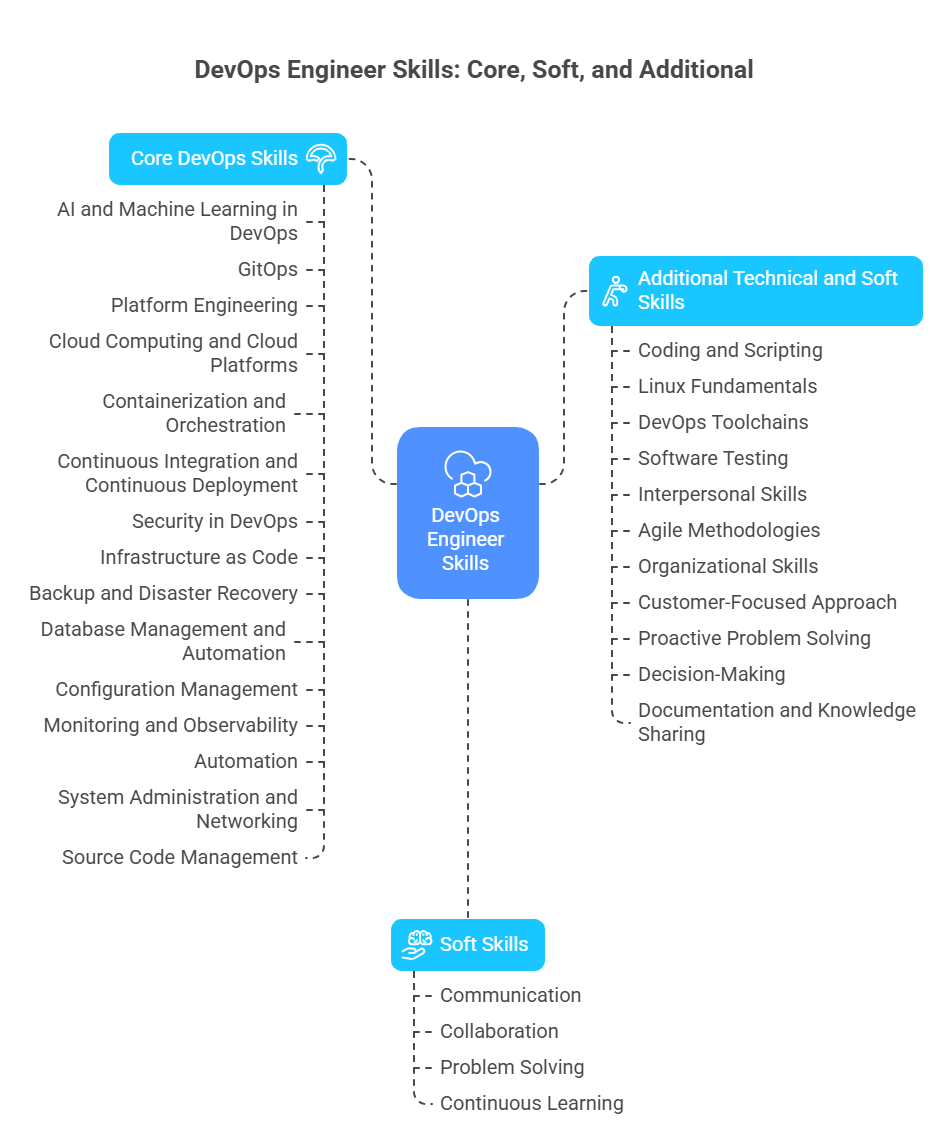
1. AI and Machine Learning in DevOps (AIOps)
AIOps stands for Artificial Intelligence for IT Operations. It uses machine learning and big data analytics to enhance system monitoring, performance optimization, and root cause analysis. DevOps Engineers equipped with AIOps skills can automate alert correlation, detect anomalies before they impact users, and predict system outages. This leads to faster incident responses, fewer manual interventions, and improved reliability in large-scale systems.
2. GitOps
GitOps is a practice that manages infrastructure and application deployments using Git as the single source of truth. With GitOps, all changes are made through pull requests, which ensures transparency, version control, and auditability. Tools like Argo CD and Flux automate the deployment process by continuously syncing your Git repositories with the live infrastructure. GitOps simplifies rollback, promotes repeatability, and aligns DevOps practices with development workflows.
3. Platform Engineering
Platform Engineering focuses on creating internal developer platforms (IDPs) that allow development teams to self-serve the infrastructure and tools they need to build, deploy, and run applications. DevOps Engineers in this role standardize the tech stack, enforce security, and streamline workflows, improving developer productivity and operational efficiency. It's about building reusable tools and services that reduce cognitive load for developers and align with DevOps principles.
4. Cloud Computing and Cloud Platforms
Cloud computing is the foundation of modern DevOps. Engineers must be fluent in at least one major cloud platform such as Amazon Web Services (AWS), Microsoft Azure, or Google Cloud Platform (GCP). Skills include provisioning virtual machines, managing storage, networking, using platform-native services like Lambda or Azure Functions, and securing cloud infrastructure. Understanding pricing models, autoscaling, and availability zones is also key to optimizing performance and cost.
5. Containerization and Orchestration
Containerization packages applications and their dependencies together, allowing them to run consistently across environments. Docker is the go-to container tool. For large-scale deployments, orchestration platforms like Kubernetes are essential. Kubernetes allows DevOps Engineers to manage clusters, auto-scale applications, ensure high availability, and perform rolling updates. Mastery in containerization enables efficient development, deployment, and resource utilization.
6. Continuous Integration and Continuous Deployment (CI/CD)
CI/CD pipelines automate the process of integrating code, testing it, and deploying it into production. Continuous Integration involves frequent code commits and automated testing to catch issues early. Continuous Deployment pushes those changes to production with minimal manual intervention. Engineers must be skilled in tools like Jenkins, GitHub Actions, GitLab CI, or CircleCI. Building reliable, secure, and scalable CI/CD workflows is a core DevOps responsibility.
7. Security in DevOps (DevSecOps)
Security must be integrated into every phase of the DevOps lifecycle. DevSecOps emphasizes automating security checks, conducting vulnerability scans, and enforcing compliance policies as part of the CI/CD pipeline. Skills in tools like Snyk, SonarQube, Aqua Security, and Vault are important. DevOps Engineers must manage secrets, implement access controls, and proactively identify potential security threats in the development lifecycle.
8. Infrastructure as Code (IaC)
IaC enables you to define and manage infrastructure using code rather than manual processes. This approach ensures consistency, reproducibility, and version control. Tools like Terraform, Pulumi, and AWS CloudFormation allow DevOps Engineers to provision and manage infrastructure across cloud platforms. IaC supports collaboration, reduces configuration drift, and accelerates disaster recovery and testing by allowing environments to be recreated instantly.
9. Backup and Disaster Recovery (DR)
High availability and business continuity require proper backup and disaster recovery strategies. DevOps Engineers must plan for data backups, implement replication and failover mechanisms, and automate recovery procedures. Cloud-native tools like AWS Backup, Azure Recovery Vault, or third-party platforms like Veeam are commonly used. A solid DR strategy ensures resilience during system failures, cyber-attacks, or outages.
10. Database Management and Automation
Modern DevOps Engineers must manage databases as part of the deployment process. This includes performance tuning, scaling, backups, and schema migration automation. Familiarity with both SQL and NoSQL databases (MySQL, PostgreSQL, MongoDB, Redis) is essential. Tools like Flyway and Liquibase help automate database migrations, making releases safer and more consistent.
11. Configuration Management
Configuration management ensures system settings are uniform across environments. Using tools like Ansible, Puppet, and Chef, DevOps Engineers automate the configuration of systems, services, and environments. This not only reduces manual errors but also helps manage large-scale deployments more efficiently. Combined with IaC, configuration management supports auditability and rollback capabilities.
12. Monitoring and Observability
Monitoring helps track system performance, usage, and failures, while observability allows deeper insight through logs, metrics, and traces. Tools like Prometheus, Grafana, Datadog, and the ELK stack provide visibility into application and infrastructure health. DevOps Engineers should build alerting systems, dashboards, and log pipelines that help proactively detect and resolve issues before users are impacted.
13. Automation
Automation is the backbone of DevOps. Whether it is building infrastructure, deploying applications, or testing code, every repetitive task should be automated. Scripting with Bash, Python, or PowerShell, and using platforms like Jenkins, GitLab CI/CD, and Ansible ensures faster delivery and reduced human error. Engineers who automate efficiently contribute to more scalable and maintainable systems.
14. System Administration and Networking
A strong foundation in Linux system administration is vital. Skills include user management, permissions, service control, cron jobs, and package management. In networking, engineers should understand DNS, HTTP/HTTPS, TCP/IP, firewalls, and load balancers. These are essential for diagnosing performance issues and ensuring the reliability of services.
15. Source Code Management
Version control systems like Git are crucial for managing code, collaboration, and rollback. DevOps Engineers should be skilled in Git workflows, branching strategies, and resolving merge conflicts. Platforms like GitHub, GitLab, and Bitbucket also integrate with CI/CD pipelines, making them essential in the modern DevOps ecosystem.
Soft Skills for DevOps Engineers
16. Communication
DevOps Engineers must clearly communicate ideas, problems, and solutions with developers, QA, security, and operations teams. Both verbal and written communication are vital for documenting processes and aligning teams on shared goals.
17. Collaboration
DevOps promotes a culture of shared responsibility. Engineers must work seamlessly with cross-functional teams, breaking down silos between development and operations to deliver value faster and more reliably.
18. Problem Solving
Diagnosing issues in distributed systems, CI/CD failures, or infrastructure bottlenecks requires analytical thinking. Problem-solving skills help engineers respond quickly to incidents, minimizing impact and ensuring stability.
19. Continuous Learning
The DevOps landscape evolves constantly. Engineers must keep up with emerging tools, cloud services, and best practices. A mindset of continuous improvement ensures relevance and innovation in a rapidly changing field.
There is a set of skills that 'YOU', as a DevOps Engineer, must have. We will talk about some of those must-have skills (Technical and Soft skills) that will make your resume shine brighter than others in this competitive race.
Other Skills for a DevOps Engineer
First of all, we will go through some of the technical skills that are important for the role of a DevOps Engineer:
20. Coding and Scripting
It is important for a DevOps engineer to be proficient in at least one of the programming language such as Python, Ruby or Java. They must be experienced in using scripting languages like Shel, PowerShell, or Bash. It helps them in automating tasks and developing infrastructure as code
21. Linux Fundamentals
DevOps environments use Linux as their operating system a lot. So it is better to have a deep understanding of Linux Fundamentals that will help in managing servers and environments. It is important, as most servers and cloud environments run on Linux.
22. DevOps Toolchains
For automation and orchestration of CI/CD pipelines, it is important to have experience with DevOps toolchains. DevOps Toolchains are a set of tools like Jenkins, GitLab CI/CD, CircleCI, and Travis CI, that are used for development, testing, deployment, and monitoring.
23. Software Testing
Testing software for bugs, performance issues, or any other kinds of issues makes sure that the software releases are reliable and that their quality is assured.
Read More: Continuous Delivery vs Continuous Deployment
24. Interpersonal Skills
DevOps is all about collaboration, so to become a skilled DevOps Engineer, it is important to be able to interact, communicate and build relationships with the team members and stakeholders.
25. Agile Methodologies
An understanding and practice of Agile principles and methodologies, such as Scrum and Kanban, are helpful for the teams to adapt to changes quickly so they can improve simultaneously.
Read More: How do agile and DevOps interrelate?
26. Organizational Skills
Organizational skills are equally important whether it s any workplace. It is always best to be able to manage tasks, prioritize work, and meet deadlines. The same is true with DevOps; it helps in the timely delivery of tasks and projects and the smooth execution of projects.
27. Customer-Focused Approach
A DevOps engineer must work with a customer-focused approach while making decisions and delivering solutions. This makes sure that the customer's needs and expectations are met.
28. Proactive Problem Solving
The ability to address issues before they get any bigger and finding solutions to them helps in maintaining the efficiency of the system.
29. Decision-Making
A good and timely decision-making based on available resources and information helps in problem-solving, ensuring the success of the project you are working on.
30. Documentation and Knowledge Sharing
It is important to be skilled in documenting processes, procedures for consistency in projects. Also, sharing them within the team promotes continuous learning.
Summary
Through this article, you learnt what skills play a part in making a DevOps Engineer skilled and ahead of others. These technical plus soft skills not only improve the efficiency of projects but also contribute to the overall success of a DevOps Engineer. If you are also thinking of becoming a DevOps Engineer, it is always best to take expert help through DevOps Certification Course that will give you a comprehensive guide to kickstart your DevOps Journey the right way.
FAQs
Take our Devops skill challenge to evaluate yourself!

In less than 5 minutes, with our skill challenge, you can identify your knowledge gaps and strengths in a given skill.

